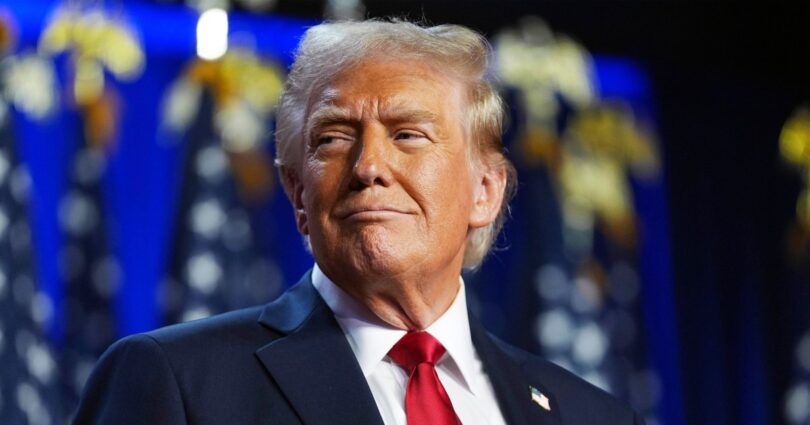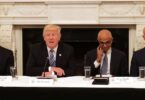Donald Trump’s return to the presidency has done something no political opponent could: put an end date on his time atop the Republican Party.
Well, sort of.
Trump single-handedly remade the Republican Party in his own image, not only becoming its unquestioned leader but also rewiring what the Grand Old Party stands for. After he emerged on the scene in 2015, former party heavyweights who did not abide by the new MAGA ethos either were cast off to irrelevance or became the subjects of intense lines of attack from Trump and his supporters.
But the fact is that the Constitution bars him from running for president again after a second term. And because Trump cannot run again, the process to figure out who will lead the party next has already begun, featuring a slate of ambitious and eager Republicans who have been eyeing the opportunity for years — and a fight that will be shaped by the now two-term president.
A dozen Republican elected officials, fundraisers and consultants said in interviews that at least in the near term, it does not matter whether Trump can run again. He will still cast an unshakable shadow over the party, one that influences who can ascend, who will descend and whether the party resets at all to resemble its pre-Trump state or continues on a path focused much more on new policy fascinations like isolationism, culture war-infused fights and tariff-focused economic policy.
“He will hold on to the party as long as he is still alive,” said a longtime Republican operative who, like others who were interviewed, was granted anonymity to speak freely about what might come next for the party.
“Trump won’t run again,” another said. “But that doesn’t mean he won’t be a major presence. He will relish his role as kingmaker and everyone sucking up to him.”
A longtime swing-state Republican operative said: “The Never Trump Republicans are gone; they are all now Democrats. The hold-your-nose Republicans will be firmly in the new Republican Party. And Reagan Democrats and union workers are now the base of the Republican Party.”
With Trump’s victory, there is a sense, some of it driven by members of the Trump family, that Vice President-elect JD Vance now becomes the natural heir apparent to the MAGA and Trump legacy. It is not something Trump himself talked about in the final weeks of the campaign — but it was the implicit signal sent by his selection of Vance as his running mate just two days after a would-be assassin targeted him in Butler, Pennsylvania, in July.
And Trump’s son Donald Trump Jr., a huge Vance ally, has directly framed Vance’s role that way.
“We are getting four more years of Trump and then eight years of JD Vance!” Trump Jr. said last week as he campaigned for Ohio Senate candidate Bernie Moreno.
Vance will now sit next to Trump in the White House for the next four years, giving him the dual opportunities to build or mend some relationships with the professional political class as he also leans into an outsider reputation the Trump base loves.
“JD has impressed. He had a shaky start, but he has steadied himself,” a veteran Republican operative said. “The professional class in D.C. despises him, yet that’s among his best sales pitches.”
Outside of Vance, a long list of ambitious Republicans think they will have the inside track to lead the Republican Party in a post-Trump landscape.
“A Trump win means [the 2028] field will be slower to develop,” a longtime Republican operative said. “Everyone will wait to see how Vance’s relationship with Trump goes and how he performs.”
“2026 midterms will be key,” the person added.
As that slow burn plays out, a field to try to succeed Trump after 12 years atop the GOP could include up to a dozen Republican heavyweights, including Florida Gov. Ron DeSantis, Arkansas Gov. Sarah Huckabee Sanders, businessman Vivek Ramaswamy, Georgia Gov. Brian Kemp, former South Carolina Gov. Nikki Haley (who was Trump’s final 2024 primary opponent), Virginia Gov. Glenn Youngkin, Sen. Ted Cruz of Texas and Sen. Tim Scott of South Carolina, among most likely a handful of others.
“It will need to be someone with enough Trump street cred but also dynamic communicators who have mastered retail politics and can raise a bunch of money,” a swing-state Republican operative said.
There are differing opinions about who that person might be as the way-too-early view of what a post-Trump Republican presidential nominee could look like takes shape.
“Trump is the most transformative political figure since Ronald Reagan. … I do believe he has permanently transformed the Republican Party and the overall national political landscape,” said a Republican lobbyist and fundraiser who has raised money for Trump. “Looking to 2028, the two top prospects, of course, would be JD Vance as a sitting vice president and Gov. Ron DeSantis as the most successful Republican governor in modern history.”
DeSantis, who is term-limited in Florida, was at one point seen as a front-runner for the 2024 GOP nomination. He raised record sums of political cash for a governor and pushed policies in Florida that opened up new fronts in the culture wars for conservatives, and he was competing with, and at times beating, Trump in many early-cycle polls.
But DeSantis’ stock dropped quickly in a primary campaign against Trump, and his campaign and his super PACs spent heavily only for him to be out after Iowa, the GOP’s first nominating contest. That precedent, others said, could be his downfall when he considers a future run.
“Why would anyone give money to him after 2024?” asked a Republican member of Congress. “He spent so much money, made so many promises and totally flamed out. I’m not sure how seriously I would consider him at this point.”
There are also arguments for several candidates who have been rising stars in Republican Party politics, even if they are not as well known among the broader voting base.
“Huckabee Sanders has bona fides in Trump world, is a rock star on the campaign trail, and with a party hunting for women — and one of the best campaigns in the party — will be in her second term as a popular governor,” a longtime Republican Party lobbyist and consultant said. “And she will still only be 46.”
That person predicted a “way-too-early” GOP 2028 ticket of Vance-Huckabee Sanders.
Ramaswamy, an avowed Trump supporter and campaign surrogate, could also get a boost in a scenario in which he replaces Vance as a senator from Ohio: “If he does get that spot, he will have a continued huge platform to amplify his message that the Trump base clearly likes,” a former Ramaswamy consultant said.
With Trump now having four more years in the White House, it is extremely unlikely that the party will be looking to make any huge policy or political shifts. But there are also a handful of potential candidates who have done enough to appeal to the Trump base but are seen broadly as more traditional Republicans.
Fitting that bill is Youngkin, whom some “Never Trump” Republicans saw earlier in the 2024 election cycle as a long-shot hope to move the party past Trump. Since then, though, he has become a reliable Trump supporter and was at one point considered as a running mate.
Haley, the former governor of South Carolina, also fits that mold.
She ran a bruising primary campaign against Trump, saying she would not “kiss the ring” after she became the candidate of anti-Trump Republicans in the primaries. Then, she said she would support and vote for Trump, even though her support at public speeches has been tepid at times.
“I know it’s noisy out there,” Haley said last month at a rally near Pittsburgh for the Republican Senate nominee in Pennsylvania. “When I tell you to take the emotion out and focus on the policies, Dave McCormick can’t win if we don’t elect Donald Trump at the top of the ticket.”
Source link








